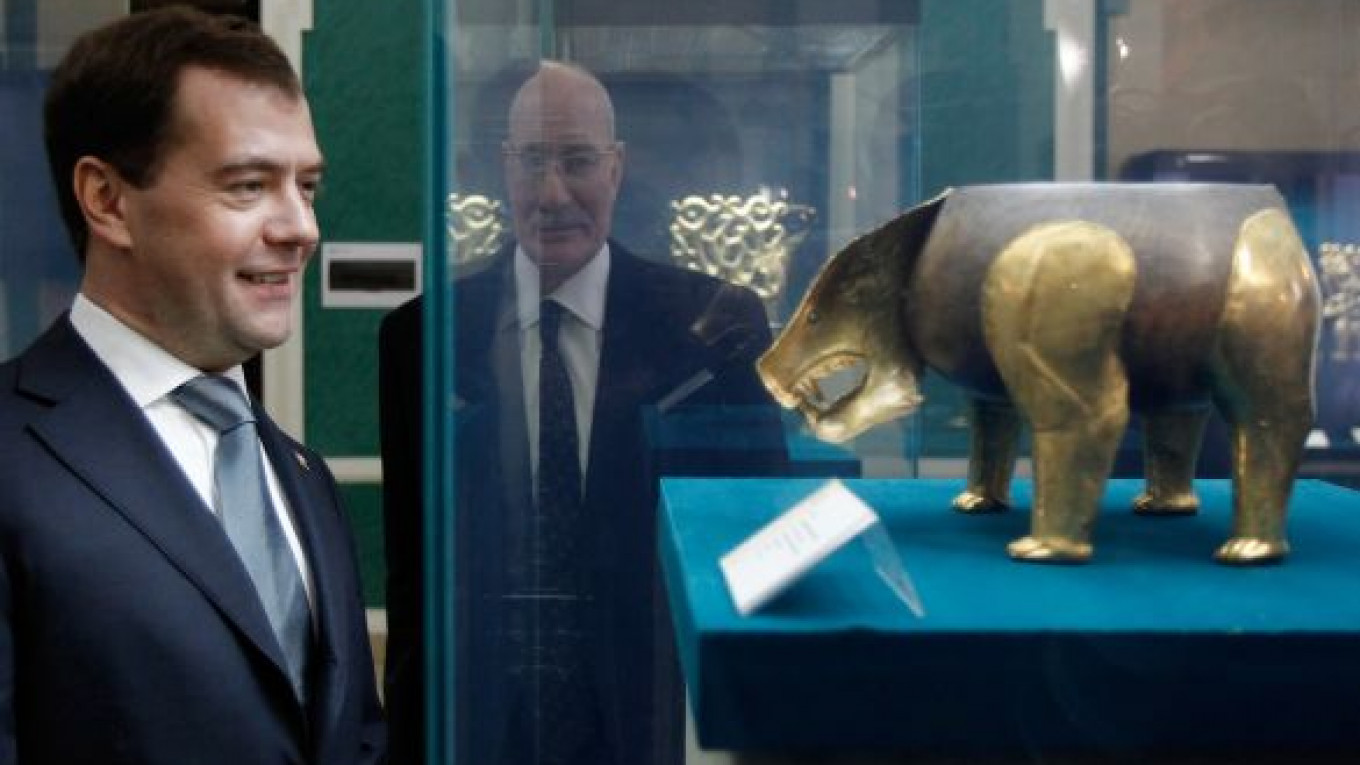Russia should not adopt the defeatist stance on multiculturalism voiced recently by top European leaders, even despite a surge in ethnic tensions, President Dmitry Medvedev said Friday.
Speaking in Ufa, the capital of the multinational Bashkortostan republic, Medvedev called for redoubling efforts to hammer out a unified Russian nation — and proposed creating new bureaucratic bodies and stepping up punishment for ethnic crimes to achieve that.
He said Russia should not "get involved in discussions about multiculturalism's collapse" because it may lead to the "destruction of traditions."
The statement was an evident dig at French President Nicolas Sarkozy, who said Thursday that multiculturalism had failed in France, joining the chorus of similar announcements made earlier by British Prime Minister David Cameron and German Chancellor Angela Merkel.
Medvedev voiced his opinion during a State Council meeting on ethnic issues, a hot topic since December's violent nationalist riots on Moscow's Manezh Square, followed by days of tension and calls for clashes between nationalists and natives of the North Caucasus.
A follow-up to the riots was announced by radicals Friday, but failed. In December, 5,500 came to Manezh Square, but only dozens showed up last week, and most of them were detained by police, who cordoned off the square and shut down the underground Okhotny Ryad mall.
Meanwhile, in Ufa, Medvedev called for the continuation of efforts to "create a complete Russian nation while preserving the identity of all peoples."
The concept of a synthetic Russian nation was first proposed by President Boris Yeltsin, but Medvedev said it had not been realized yet.
"We did not succeed completely. … But other countries have succeeded, and we should do the same," he said, without elaborating on examples.
He proposed forming a separate federal body to handle ethnic policy matters, which are currently in the hands of the Regional Development Ministry.
Similar committees, comprised of representatives of local religious denominations, will be created in the regions, Medvedev said.
Meanwhile, people convicted of extremism are to be barred from holding state jobs and working in education, with a draft bill to be submitted to the State Duma "soon," he said.
Medvedev also called for stepping up punishment for ethnic hate crimes, currently carrying a maximum prison sentence of two years.
The proposals are a move in the right direction, but may require more effort, said Vladimir Mukomel, head of the Center for Ethnopolitical and Regional Studies.
There are "no tools on the federal level" to deal with ethnic conflicts, he said by telephone Friday.
But tackling the ethnic issue also requires changing legislation and increasing the role of the police, Mukomel added.
A state program to promote tolerance and fight extremism was started in 2000, but it was wound up one year ahead of the schedule, in 2004, because of "successful implementation," he said.
In Ufa, Medvedev also called on prominent Russian artists and arts groups, including the Bolshoi Theater and Russian Philharmonic Orchestra, to promote national unity by touring more in the regions, including the North Caucasus, instead of playing abroad.
The president himself also paid duty to cultural heritage during the trip to Bashkortostan, a predominantly Muslim region populated by some 130 nationalities.
Medvedev visited an Ufa mosque and an exhibition on "interethnic agreement" at the local Museum of Archeology and Ethnography.
A Message from The Moscow Times:
Dear readers,
We are facing unprecedented challenges. Russia's Prosecutor General's Office has designated The Moscow Times as an "undesirable" organization, criminalizing our work and putting our staff at risk of prosecution. This follows our earlier unjust labeling as a "foreign agent."
These actions are direct attempts to silence independent journalism in Russia. The authorities claim our work "discredits the decisions of the Russian leadership." We see things differently: we strive to provide accurate, unbiased reporting on Russia.
We, the journalists of The Moscow Times, refuse to be silenced. But to continue our work, we need your help.
Your support, no matter how small, makes a world of difference. If you can, please support us monthly starting from just $2. It's quick to set up, and every contribution makes a significant impact.
By supporting The Moscow Times, you're defending open, independent journalism in the face of repression. Thank you for standing with us.
Remind me later.






